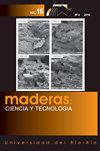An evaluation of clove (Eugenia caryophyllata) essential oil as a potential alternative antifungal wood protection system for cultural heritage conservation
IF 1.5
4区 农林科学
Q3 MATERIALS SCIENCE, PAPER & WOOD
引用次数: 2
Abstract
This paper investigates the potential of clove (Eugenia caryophyllata) essential oil (C-EO) as a wood protection system for use in cultural heritage conservation. The preventive and curative antifungal efficacy of C-EO was compared to a boron containing wood preservative (Diffusit S) in two laboratory tests on European beech (Fagus sylvatica) and Scots pine sapwood (Pinus sylvestris) mini-blocks. Non-sterile, air-infected wood samples were employed in the first test, while wood samples with active attack, as result of inoculation with three fungal strains isolated from cultural heritage sites, in the second test. Untreated controls and C-EO-treated wood blocks were incubated up to 150 days to monitor and quantify fungal growth. The experimental results showed antifungal efficacy of C-EO to be higher than that of the boron wood preservative at the concentrations used. Concentrations of C-EO 5 % 10 % in ethyl alcohol prevented mould growth for at least 150 days, while a concentration of 10 % delayed or suppressed active attack by decay fungi. This effect, determined up to 90 days of incubation, was dependant on the type of fungus.丁香(Eugenia caryophyllata)精油作为文物保护中潜在的抗真菌木材保护体系的评价
本文研究了丁香精油(C-EO)作为木材保护体系在文物保护中的应用潜力。在对欧洲山毛榉(Fagus sylvatica)和苏格兰松材(Pinus sylvestris)迷你块进行的两项实验室试验中,比较了C-EO与含硼木材防腐剂(Diffusit S)的预防和治疗性抗真菌效果。第一次试验采用非无菌的、空气感染的木材样品,而第二次试验采用从文化遗产中分离出的三种真菌菌株接种的具有活性攻击的木材样品。未经处理的对照和c - eo处理的木块孵育达150天,以监测和量化真菌生长。实验结果表明,在不同浓度下,C-EO的抑菌效果优于硼木防腐剂。乙醇中浓度为5% - 10%的C-EO可阻止霉菌生长至少150天,而浓度为10%的C-EO可延迟或抑制腐烂真菌的主动攻击。在90天的孵育中,这种效果取决于真菌的类型。
本文章由计算机程序翻译,如有差异,请以英文原文为准。
求助全文
约1分钟内获得全文
求助全文
来源期刊

Maderas-ciencia Y Tecnologia
工程技术-材料科学:纸与木材
CiteScore
2.60
自引率
13.30%
发文量
33
审稿时长
>12 weeks
期刊介绍:
Maderas-Cienc Tecnol publishes inedits and original research articles in Spanish and English. The contributions for their publication should be unpublished and the journal is reserved all the rights of reproduction of the content of the same ones. All the articles are subjected to evaluation to the Publishing Committee or external consultants. At least two reviewers under double blind system. Previous acceptance of the Publishing Committee, summaries of thesis of Magíster and Doctorate are also published, technical opinions, revision of books and reports of congresses, related with the Science and the Technology of the Wood. The journal have not articles processing and submission charges.
 求助内容:
求助内容: 应助结果提醒方式:
应助结果提醒方式:


